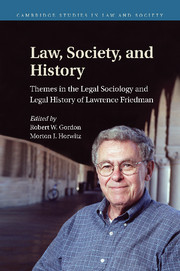Book contents
- Frontmatter
- Contents
- Contributors
- Introduction
- PART I OVERVIEWS AND ASSESSMENTS OF FRIEDMAN'S WORK
- PART II APPLICATIONS OF CONCEPTS, INSIGHTS, AND METHODS IN FRIEDMAN'S WORK
- PART III THE LEGAL PROFESSION
- PART IV LAW AND LARGE AREAS OF SOCIAL LIFE
- PART V FACTS FROM THE UNDERGROUND: DIGGING LEGAL HISTORY OUT OF THE CELLAR
- 16 Historian in the Cellar
- 17 The Discreet Charm of Inquisitorial Procedure
- 18 “Keep Negroes Out of Most Classes Where There Are a Large Number of Girls”
- 19 Taking Legal Realism Offshore
- PART VI PERSPECTIVES FROM OTHER CONCEPTUAL WORLDS
- Index
- Titles in the series
18 - “Keep Negroes Out of Most Classes Where There Are a Large Number of Girls”
The Unseen Power of the Ku Klux Klan and Standardized Testing at The University of Texas, 1899–1999
Published online by Cambridge University Press: 07 October 2011
- Frontmatter
- Contents
- Contributors
- Introduction
- PART I OVERVIEWS AND ASSESSMENTS OF FRIEDMAN'S WORK
- PART II APPLICATIONS OF CONCEPTS, INSIGHTS, AND METHODS IN FRIEDMAN'S WORK
- PART III THE LEGAL PROFESSION
- PART IV LAW AND LARGE AREAS OF SOCIAL LIFE
- PART V FACTS FROM THE UNDERGROUND: DIGGING LEGAL HISTORY OUT OF THE CELLAR
- 16 Historian in the Cellar
- 17 The Discreet Charm of Inquisitorial Procedure
- 18 “Keep Negroes Out of Most Classes Where There Are a Large Number of Girls”
- 19 Taking Legal Realism Offshore
- PART VI PERSPECTIVES FROM OTHER CONCEPTUAL WORLDS
- Index
- Titles in the series
Summary
ADMISSIONS
Nine days after Chief Justice Earl Warren issued the U.S. Supreme Court's 1954 opinion in Brown v. Board of Education, The University of Texas's Registrar and Dean of Admissions – a man named Henry Y. McCown – wrote to President Logan Wilson with a plan to “keep Negroes out of most classes where there are a large number of girls.”
SIMKINS
William Stewart Simkins – a University of Texas (UT) law professor from 1899 until his death in 1929 – and his brother Eldred James Simkins, a regent of The University of Texas from 1882 to 1896, organized the Ku Klux Klan in several Florida counties after the American Civil War. The brothers Simkins were natives of South Carolina's Edgefield District, which also claims James Henry Hammond, “Pitchfork” Ben Tillman, and Strom Thurmond as native sons. William Stewart Simkins attended the Citadel in Charleston, and he helped start the Civil War by relaying the order to fire on the “Star of the West,” a vessel carrying provisions to Ft. Sumter. He entered the Confederate army as a lieutenant and by war's end held the rank of colonel. Until the end of his life, he was known as Colonel Simkins.
- Type
- Chapter
- Information
- Law, Society, and HistoryThemes in the Legal Sociology and Legal History of Lawrence M. Friedman, pp. 309 - 336Publisher: Cambridge University PressPrint publication year: 2011



